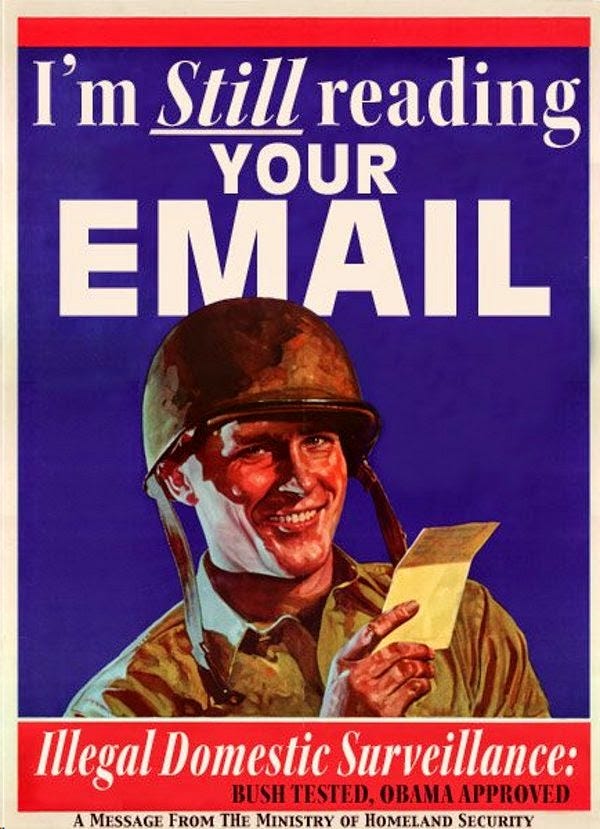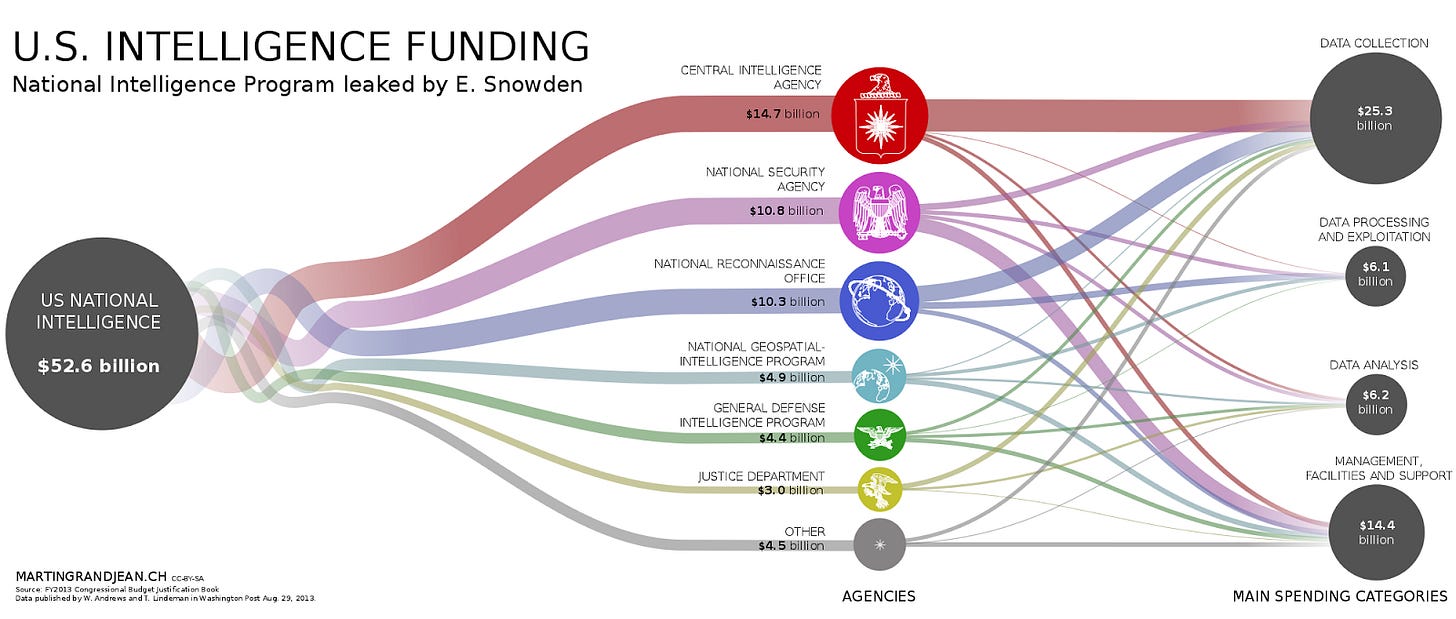Secret political spying by police endangers our democracy

When the Partnership for Civil Justice Funds published documents pertaining to law enforcement surveillance of Occupy protests. Members of the so-called counterterrorism fusion center in Boston, called the Boston Regional Intelligence Center (BRIC), kept tabs on the political associations and speech of then-State Representative Marty Walsh, who’s now the Mayor of Boston.
Boston news agencies barely covered it and public apathy is a major concern. Could it be that people have become accustomed to the idea that a spy center established to monitor and catch terrorists is keeping records of the perfectly legal political activities of a wide variety of organizers and groups, including elected officials? Or is it that people don’t see a problem with police officials keeping tabs on lawful political activity?
If it's the latter, we have a serious problem. Government surveillance of political speech chills democratic engagement and stymies social and political progress. It sends a message to ordinary people and politicians alike: “We are watching you.”
Police justifications for this behavior are B/S! In Boston, officials claimed Occupy records were maintained for “crowd control” and “traffic” purposes. Boston police officers made note of details related to hundreds of events that had no bearing on crowd control or traffic. The Boston police even monitored the political activities of elected officials.
What's this illegal political surveillance really about? Like most surveillance, it's about control.
Why else would the courts allow the NSA & tech companies to read our emails without a warrant?

Police in the U.S. have been keeping records of and tracking dissident speech and association for decades. The problem isn’t new. But it’s getting more and more dangerous in part because of the blurring of the lines—among officials—between behavior characterized as “terrorist” and that which is obviously pure expression of political dissent.
The blurring of these lines isn’t an accident, and it isn't even a product of the latest war. But today the stakes are higher than ever before. In a never-ending "war on terror", with the entire world cast as the battlefield, the conflation of the dissident with the terrorist has concrete ramifications for individuals that go beyond being smeared as a villain. As soon as the government identifies you as a terrorist, you are subject to an entirely different legal regime, one shrouded in secrecy, governed by vague "state secrets" and "national security" claims, and subject to indefinite detention or even extrajudicial assassination.
In domestic law enforcement, the collapsing of the boundary between terrorism and political speech is coming from the very top of the US government.
In the spring of 2014, White House national security advisor Lisa Monaco visited the Harvard Kennedy School and gave a speech that should chill the soul of every person who cares about freedom of expression and democracy. During her remarks, Monaco announced a Department of Homeland Security plan to place an envoy in Boston to tackle “homegrown violent extremism” among communities. As Mike German of the Brennan Center writes in a letter to the Deputy Secretary of DHS, to which the ACLU and the ACLU of Massachusetts are signatories,
Countering violent extremism (CVE) programs are controversial because several government and non-government entities have promoted unfounded and discredited theories of terrorist radicalization that improperly identify First Amendment-protected religious and political activities as precursors to, or predictive of terrorist attacks…
These reports posit virtually identical four-step processes to becoming a terrorist, and both identify First Amendment-protected activities, such as mosque attendance and activism within Muslim political or social groups, as “steps” or “indicators” of increasing radicalization toward violence. Many of the so-called “indicators” are common activities for large numbers of American Muslims, such as wearing religious attire or growing a beard, which increases the likelihood that all Muslims will be unfairly targeted for investigation and surveillance based on these reports. Indeed these reports appear to provide the policy justification for overbroad surveillance of Muslim communities conducted by the FBI and NYPD that have chilled the free exercise of American Muslims’ religious and political rights.
The civil liberties groups that signed on to German’s letter have good reason to be concerned about what the DHS envoy to Boston will be doing, given what Monaco told the audience at Harvard. As German writes, Monaco advised that parents, teachers, and other community members look for “subtle” signs of radicalization:
"For instance, parents might see sudden personality changes in their children at home—becoming confrontational," she said. "Religious leaders might notice unexpected clashes over ideological differences. Teachers might hear a student expressing an interest in traveling to a conflict zone overseas. Or friends might notice a new interest in watching or sharing violent material."
Anyone who has ever been a teenager knows that "becoming confrontational", questioning religious doctrine, possessing curiosity about the world far away from home, and watching or sharing violent material are fairly or extremely common behaviors, and not at all indicative of a predisposition for violence.
The First Amendment makes it difficult for law enforcement to put us in jail for expressing our thoughts and opinions. But the government has carved out a substantial Muslim exemption to the First Amendment, and police surveillance of free speech significantly chills expression—even if we don’t end up in jail for it.
Even worse, government surveillance of protected First Amendment speech doesn’t just threaten the character of an open society; it also imperils public safety. After all, when police officers are tasked to monitor antiwar protests, the political activities of state representatives and unions, and the religious practices of large groups of law-abiding people, they aren’t doing their jobs: solving crimes.
Programs like the "countering violent extremism" pilot in Boston must not operate from the assumption that dissent or religiosity are indicators of potential threats. Young people should never fear that they’ll be reported to a Fusion Center/DHS for voicing unpopular views at home, at church, or in school.
Mayors should never have to worry that their support for unions will land them in a counterterrorism center’s spy database. These practices waste money, create a toxic environment of fear and hostility towards the police, and make it more likely that truly dangerous people will slip through the cracks. Perhaps most devastatingly, however, these practices send a clear message that any behavior or speech challenging the status-quo will be viewed as a potentially criminal threat.
Dissent isn’t terrorism, and being Muslim isn’t a crime. Surveillance isn't about whether you have "something to hide" or not. The kind of discriminatory surveillance happening across the world today, directed at people for their political and religious views, imperils democratic societies.
From the Pentagon to the FBI and all the way down to our state and local law enforcement, the message is clear: dissent is a threat that must be neutralized, and surveillance is the first step towards maintaining the status quo.
http://privacysos.org/node/1437
NSA can neither confirm nor deny it uses certain surveillance phrases:
Investigative reporter Jason Leopold recently filed a FOIA request asking the agency to turn over any documents related to the phrases displayed on the leaked slide pictured below:

Leopold asked the NSA about its variations on the phrase "collect it all" (a.k.a. former NSA head Keith Alexander's personal motto), including "sniff it all," "process it all," "exploit it all," "partner it all" and "know it all." As is its particular idiom, the NSA Glomared all over the response letter. (via Freedom of the Press Foundation's Trevor Timm)
Your request appears to be related to recently published information about alleged NSA activities. Therefore, to the extent that your request seeks any information about NSA intelligence programs, or in relation to any specific methods or means for conducting the programs, we cannot acknowledge the existence or nonexistence of such information.
We have determined that the fact of the existence or nonexistence of the materials you request is a currently and properly classified matter in accordance with Executive Order 13526, as set forth in Subparagraph of Section 1.4. Thus, your request is denied pursuant to the first exemption of the FOIA which provides that the FOIA does not apply to matters that are specifically authorized under criteria established by an Executive Order to be kept secret in the interest of national defense or foreign relations and are, in fact properly classified pursuant to such Executive Order.
Quick question: if the material, in fact, does not exist, is it still "properly classified?"
In addition, this Agency is authorized by various statutes to protect certain information concerning its activities. The third exemption of the FOIA provides for the withholding of information specifically protected from disclosure by statute. Thus, your request is also denied because the fact of the existence or non-existence of the information is exempted from disclosure pursuant to the third exemption.
So, not only are the phrases apparently subject to a variety of FOIA exemptions, even a simple nod of recognition in the direction of the NSA's "collect it all" aspirations is strictly forbidden. It's enough to make you want to drag the NSA into the nearest interrogation room and yell at it while jabbing repeatedly at the slide above, "THIS! THIS! DOES THIS LOOK FAMILIAR?!??"
As mentioned earlier, this is standard operating procedure for the agency, which has greeted this new, forced era of openness with begrudging releases (compelled by court orders) of previously classified documents and an unwillingness to confirm or deny anything about its programs. People who have requested anything the NSA has gathered on them personally are familiar with this response. Even the FBI will cough up its own files if asked, but the NSA can't even let respondents know whether or not it's siphoned up any of their metadata, presumably because doing so allows the terrorists to win. https://www.techdirt.com/articles/20140614/17181327584/nsa-can-neither-confirm-deny-it-uses-phrases-it-used-leaked-slide.shtml
U.S. intelligence agencies $52.6 billion black budget revealed:
The top-secret documents recently released by Edward Snowden through the Washington Post reveal the funding of the U.S. intelligence agencies.
It appears that the 2013 budget of the National Intelligence Program totaled $52.6 billion. This sum is divided among a multitude of actors, but five agencies are particularly endowed : CIA (28%), NSA (21%), NRO (20%), NGP (9%) and GDIP (8%).
Four categories are distinguished. An important part of the total amount is spent in the “data collection” category (gathering raw information, surveillance, satellites, covert actions…). The data is then exploited and analyzed. The “management” category is also financially important (determining issues and tasks).


http://www.washingtonpost.com/wp-srv/special/national/black-budget/
http://www.washingtonpost.com/world/national-security/black-budget-summary-details-us-spy-networks-successes-failures-and-objectives/2013/08/29/7e57bb78-10ab-11e3-8cdd-bcdc09410972_story.html?hpid=z9



